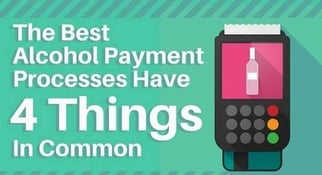
Whether you are an alcohol manufacturer, distributor or retailer, you've most likely looked into using automated alcohol payment processes. We want you to know that the best alcohol payment processes have 4 things in common. And you don't have to wonder what those four things are because we have them set out below:
1. Convenient: Save Both Time and Paperwork
The best automated systems provide EFT debit processing from the retailer to pay the distributor, so less money changes hands. Without checks, cash, escrow deposits, and money orders, there is less of a chance for theft. The distributor gets paid immediately so streamlined accounts eliminate his receivables tracking. The retailer receives confirmation that the bill has been paid so it relieves their accounting department of the burden of accounts payable tracking.
Electronic payment systems save on both time and paperwork. You can even integrate the electronic system with your accounting system and import data directly into your accounts. In addition, the automated payment systems electronically stores invoice details in the system. The system eliminates hard copy filing, losing invoices, etc. You can retrieve information on an invoice years later. If a retailer needs a credit for returned items, the system not only generates the credit request but tracks the request automatically.
Electronic payment systems help eliminate pricing errors. The system conveniently integrates prices so that all the prices and changes to those prices remain available for review by both retailers and distributors.
Finally, the electronic payment system saves time. Paper-based systems require hand-filled out invoices. Upon delivery, retailers have to go in the office to generate a money order, find the checkbook and write a check for payment or the retailer counts out the money, then the distributor recounts the same cash. The distributor then has to mark the invoice as paid with the check number.
It all involves time that both companies could better use to serve clients. The automated system does it all for you, stores it for you, and keeps track of all transactions for you.
2. Compliant: Conform to All Regulations
If you do business nationally, you will want an automated payment system that conforms to the regulatory environment in all 50 states and that's authorized by 50 states. At the same time, it's important to have a uniform b2b payment solutions system in place that conforms to the myriad of payment regulations.
Each state has its own set of rules within a three-tiered system corresponding to manufacturers/suppliers, distributors, and retailers. With respect to the 50 states, some are cash states, some are term states, and some allow both cash and term. With respect to beer, some states allow cash-on-delivery (COD) and some are term states. With respect to wine, some states allow COD, some states are term states, and a few are state controlled. With respect to spirits, a few states allow COD, while others are term states, and still others are state controlled.
What happens if your payment system does not comply? If you fail to comply with regulations terms, you may experience blacklisting, fines and penalties depending on each state's rules, and loss of your alcohol license.
A Guide to Simpler, Smarter Alcohol Payments
Download our ebook and learn how you can simplify your payment processes and stay compliant with an automated B2B payment solution.
3. Secure: Eliminate the Need for Cash
Automated payment systems are simply more secure because the system eliminates the need for cash. This immediately eliminates the incentive for robbery post-delivery because there is no cash to steal. Distributor profits sometimes increase because insurance rates potentially will decrease.
Leveraging b2b electronic payments are more secure because the automated system makes all payments comply with state and local regulations. All information is stored in a secured portal that both retailers and distributors can access.
Electronic payment systems eliminate late payments, eliminate the possibility for bad checks and help prevent fraud and product loss. It puts all sales on a final, legitimate, and immediate basis. Electronic payment systems save time; save money; increase security.
4. Automatic: Reconciliation of Invoice Errors
Errors on alcohol delivery invoices and receiving can be caused by a multitude of inconsistencies between retailer and distributor records. This includes: cost differences, case pack variances, receiving quantity errors, and even inaccurate credits issued for damaged or out-of-code merchandise.
With industry-leading technologies such as iControl's patent-pending next gen b2b payment, retailers can have any invoice errors reconciled electronically and eliminate the need for manual comparisons, tracking and credit request submissions.
In addition, this proprietary technology can identify errors automatically that may have been missed under a manual process for reconciliation. Key reports include:
- Line Item Matching - that dynamically matches Vendor line items to Retailer price books that enables a more proactive approach to prevent errors before they occur at the invoice level
- Vendor Invoice Details - credit amounts are identified automatically at the invoice level, and the subsequent credit request is generated and tracked until resolution
- Vendor Scorecards - establish greater accountability throughout the distribution network by comparing distributor performance based on key performance metrics such as invoice error rates, delivery invoices without receiving records and total credit amounts
- Cost Variance Scorecards - provides summaries of cost variances by store, by product and by vendor to obtain a high-level perspective on factors that may be having a broad impact on invoice and receiving accuracy
- Product Cost Dashboards - allows retailers to assess product unit costs across distributors to ensure the best costs are made available at a regional and store level
- Category Cost Dashboards - enables retailers to gain control over their profitability projections by providing forecasts for product costs by product category and by Vendor
To learn more, please contact us. We look forward to discussing how our electronic payment system can help you grow your alcohol business more profitably.
Download our eBook and learn how you can stay compliant with alcohol regulations in 2021 and beyond.
Get The eBook Now